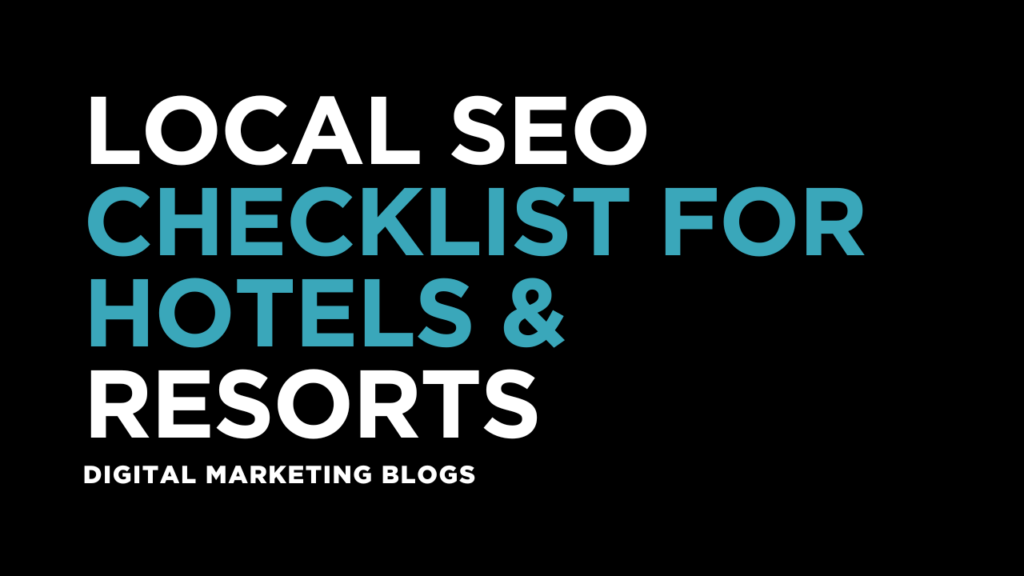For hotels and resorts, local visibility is everything. With travelers relying heavily on Google Search and Maps to find accommodations, an optimized local SEO strategy can make all the difference in getting more bookings and standing out from the competition.
This comprehensive checklist is designed specifically for hospitality businesses aiming to improve their local search presence and attract more guests organically.
Why Local SEO Matters for Hotels & Resorts
Local SEO helps hotels and resorts appear in search results when users look for nearby accommodations, such as:
- “best beach resort near me”
- “luxury hotels in Kochi”
- “affordable family hotels in Goa”
Improving your local SEO leads to:
- Increased website traffic and direct bookings
- Better visibility on Google Maps and local pack
- More positive reviews and reputation management
- Reduced dependence on OTAs like Booking.com and Expedia
Local SEO Checklist for Hospitality Businesses
1. Claim and Optimize Google Business Profile
- Use your exact business name
- Add accurate NAP (Name, Address, Phone number)
- Choose the right category (e.g., Hotel, Resort, Bed & Breakfast)
- Add high-quality photos and videos
- Use attributes like “Free Wi-Fi”, “Pet-Friendly”, “Free Breakfast”
- Enable messaging and booking integrations
2. Ensure NAP Consistency
Your Name, Address, and Phone number must be consistent across:
- Website
- Social media profiles
- Online directories (TripAdvisor, Yelp, Justdial, etc.)
Inconsistencies can confuse search engines and hurt your rankings.
3. Create Location-Specific Landing Pages
If you have multiple properties or locations, create individual pages for each. These pages should include:
- Unique descriptions
- Local attractions nearby
- Directions and transportation tips
- Local keywords (e.g., “hill station resorts in Munnar”)
4. Use Local Keywords in Content
Integrate geo-targeted keywords in:
- Title tags and meta descriptions
- Headings (H1, H2, H3)
- URLs (e.g., /resorts-in-alappuzha/)
- Image alt text and captions
Examples:
- “Heritage hotel in Jaipur”
- “Beachfront resort in Varkala”
5. Optimize for Mobile and Speed
- Ensure your site is mobile-responsive
- Compress images for faster loading
- Use AMP (Accelerated Mobile Pages) where possible
- Check speed using tools like Google PageSpeed Insights
6. Get Listed in Local Directories
Submit your business to relevant platforms:
- TripAdvisor
- MakeMyTrip
- Goibibo
- Cleartrip
- Booking.com
- Expedia
Ensure the information is accurate and up-to-date.
7. Encourage and Respond to Reviews
- Ask satisfied guests to leave reviews on Google, Facebook, TripAdvisor
- Monitor reviews regularly and respond politely
- Address complaints constructively
- Highlight reviews on your website for social proof
8. Embed Google Maps on Contact Page
Adding a Google Map helps with local SEO and makes it easy for guests to find your location.
- Use the correct latitude and longitude
- Place the map prominently on the Contact or Location page
9. Leverage Local Content Marketing
Blog about:
- Local events and festivals
- Travel guides for your area
- Food and culture nearby
- Top things to do around your hotel
This builds authority and improves relevance in local search results.
10. Use Schema Markup for Hotels
Implement structured data using schema.org to help search engines understand your business:
- Hotel schema
- Review schema
- Event schema (if you host local events)
Tools like Google’s Structured Data Testing Tool can help you validate your markup.
11. Build Local Backlinks
Earn links from:
- Local news websites
- Tourism boards
- Travel bloggers
- Nearby businesses and vendors
These backlinks signal relevance and authority in your region.
12. Track Your Performance
Use tools to monitor progress:
- Google Search Console: keyword rankings and site performance
- Google Analytics: traffic sources and conversions
- Moz or BrightLocal: local citation audits and rankings
Regularly audit your listings and update them as needed.
Bonus Tip: Optimize for Voice Search
Voice searches like “Which resort in Munnar has a pool?” are growing. Focus on natural language queries and FAQs to capture voice traffic.
Final Thoughts
Local SEO is not just about ranking higher—it’s about being found by the right guests at the right time. With this checklist, your hotel or resort can establish a strong local presence, drive more direct bookings, and reduce reliance on third-party platforms.
For personalized local SEO support, consider reaching out to an experienced seo expert in calicut who understands regional nuances and can tailor strategies for maximum impact.



